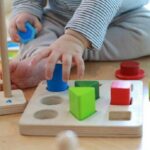In Vietnamese folk beliefs, there has long been an association between the shape of one’s ears and their luck, intelligence, and overall success in life. Phrases such as “large ears bring great fortune,” “thick ears denote a future official,” or “a child with big ears will surely grow up to be intelligent” are commonly heard. But is there any scientific basis to these beliefs? Interestingly, a recent study from Russia has shed some light on the connection between ear size and intelligence in children.
Findings from the Kazan Federal University, Russia
A team of scientists led by Professor Mustafin at Kazan Federal University conducted an in-depth investigation into the relationship between ear size and cognitive abilities in young children. Their findings revealed that children with larger ears tended to have higher IQ scores compared to their peers with smaller ears.

The study didn’t stop at overall ear size; the researchers also found that the difference in size between the left and right ears could indicate a child’s dominant cognitive domain. Specifically:
- Children with larger right ears tended to excel in fields like Mathematics, Physics, and other natural sciences.
- On the other hand, those with larger left ears demonstrated stronger cognitive and creative abilities in the humanities, arts, and language domains.
Why might larger ears be associated with higher intelligence?
According to the scientists, ear size is not just a physical feature; it may also relate to auditory acuity, which is crucial in the learning process and cognitive development. Children with larger ears often have better hearing sensitivity, enabling them to receive information from their surroundings more effectively.
Especially during the early formative years, when children are learning to speak, communicate, and develop their thinking skills, good hearing ability plays a vital role. Larger ears enhance sound reception, thereby facilitating language development and quicker reflexes.
Additionally, the dominance of one ear over the other may reflect the more active functioning of the opposite brain hemisphere. The left brain controls logic and calculation, while the right brain governs emotions and creativity. Thus, ear asymmetry can sometimes signify an individual’s “cognitive dominance.”

Are the folk beliefs about ear size and intelligence grounded in reality?
Considering the findings of the Russian research team, it appears that the traditional Vietnamese folk beliefs hold some merit. While lacking clear scientific evidence, the association between large ears and talent, good fortune, and intelligence is understandable within the context of cultural values and traditional beliefs.
Even in Eastern philosophies, such as Feng Shui, individuals with larger and fuller ear lobes are believed to be blessed with good fortune, talent, and longevity. This belief somewhat aligns with the revelations of modern research.
Don’t worry if your child has small ears
While the study offers intriguing insights, it’s essential to remember that intelligence results from multiple factors: genetic predispositions, environmental influences, educational approaches, nutritional intake, and lifestyle habits. If your child has small ears, it does not imply any lack of intelligence.
What truly matters is nurturing their thinking skills, encouraging creativity, providing a positive learning environment, and showering them with love. Intelligence is multifaceted, and ear size is just one intriguing aspect that science is exploring.
Modern science is indeed fascinating as it uncovers the rationale behind folk beliefs. While ear size may not be the sole determinant of intelligence, the Kazan Federal University study has broadened our understanding of the potential link between physical attributes and cognitive development.
Ultimately, whether your child has large or small ears, the most important factors for their success are your attention, proper guidance, and the positive environment you create for them every day.
The Science Behind Why September and October Babies Are Smarter
“Recent statistical research by scientists has revealed an interesting trend. Children born in the months of September and October tend to exhibit higher intelligence quotients. This intriguing finding sheds light on potential seasonal influences on cognitive development and has sparked further exploration into the factors that contribute to intellectual prowess.”





































